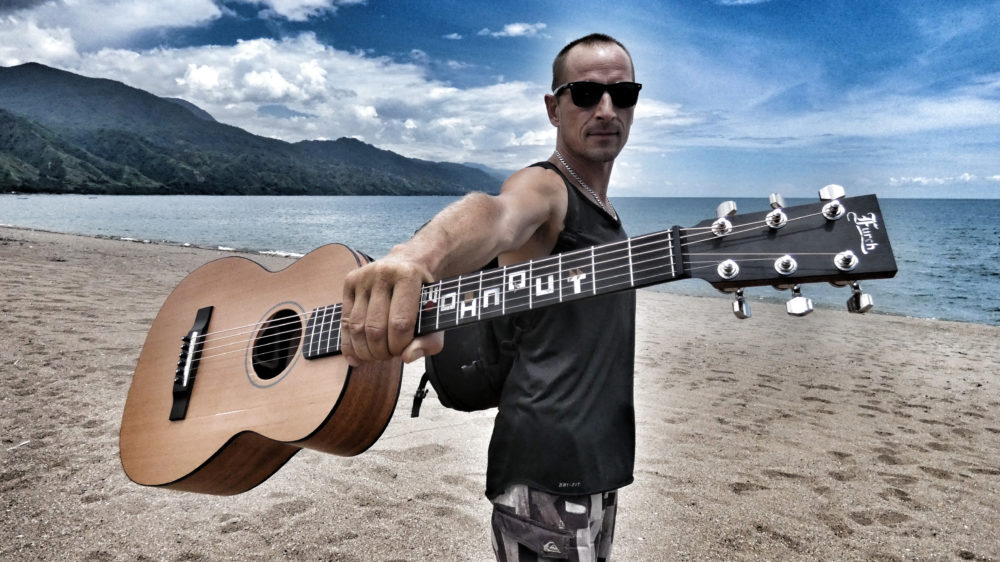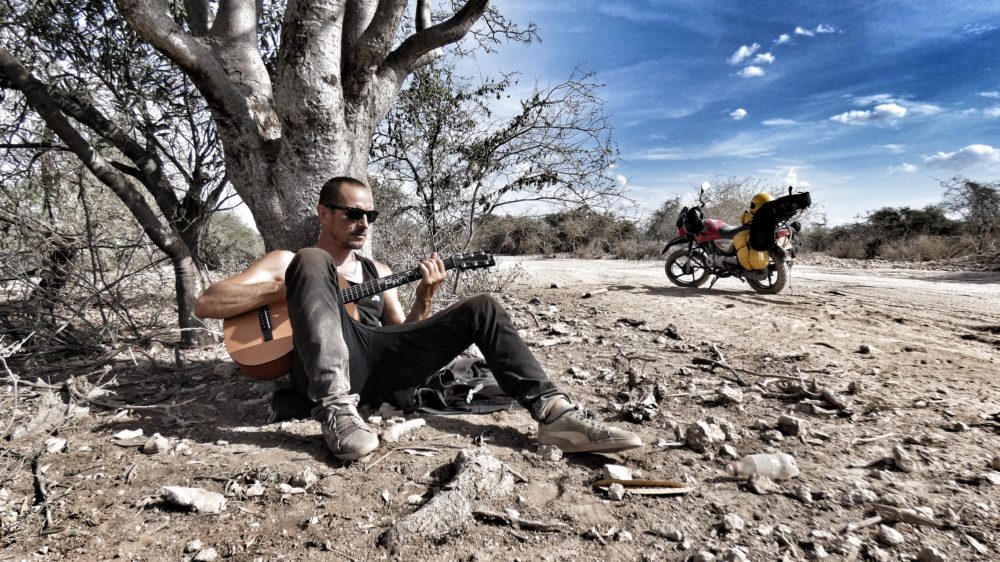Little Jane conquers Africa
The sun is shining overhead, as a small motorbike I borrowed from a friend in Nairobi is purring away beneath me. Behind me is a girl with who I’ve traveled on various bikes through a large part of the globe, and in the back, tied to the frame, is my Little Jane travel guitar. And all around us, there is the world we know from TV shows about exotic animals. East Africa. We’re right there, we can see it, we can touch it. There is hardly anything else one could imaginably wish for.
I’ve picked up my Little Jane, a travel guitar made by Furch Guitars, because I often travel on a motorbike. It’s an ideal solution because a standard-size instrument simply can’t be safely transported on a bike. I was able to design the fingerboard, and out of loyalty to my job, I had Furch inlay the name of my band in it. The guitar plays and sounds beautifully. It can be assembled and disassembled in a flash, and stored in a medium-sized backpack. That’s a smart feature for the traveling guitarist for sure.
If you have your bike and a guitar that can be taken along, you have complete freedom. You can go wherever you want to. You can make a stop. Stay for a few days. Sit back, watch something beautiful, and strum your guitar. You can make plans what to do and where to go as you cruise along, and make changes on the spur of the moment. That’s why I’ve got me my Little Jane.

All this is because you are completely free to choose the route you take and the tempo of both your music and your travels. You can use travel guides, Google Maps, or just ask people along the way because they will give you best directions. Here in Kenya and Tanzania, there are motorbike route restrictions because of national parks. It’s for security reasons, because of a high concentration of dangerous animals.
These animals live here, there are lots of them. They can be encountered inside and outside reservations because they don’t care about borders. Zebras, giraffes, elephants, wildebeests, antelopes of all kinds, monkeys, hippos, crocodiles, ostriches, and all sorts of other birds… You need no special luck to see them; they’re right there next to the road. Seeing these creatures is no less than breathtaking.
The same can be said about endless horizons, virgin landscapes, farming land, deserts, semi-deserts, savannas, jungles, primeval forests, and mountains, most notably the mighty Kilimanjaro. Swimming in huge lakes, like Lake Victoria, Lake Malawi, and Tanganyika, or in the warm waters of the Indian Ocean. Tons of godforsaken places where the red-hot African sun sets every evening. Tourism is restricted to a few of the best-known national parks, Kilimanjaro, and Zanzibar. Everywhere else, you’re alone – well not exactly alone, you’re together with the locals who call you muzungu and always greet you with a smile. There are people of all sorts of ethnic origin who speak many different languages and have many different cultures. You don’t understand much, but being a muzungu, you can tell the ornamented Maasai because you’ve seen pictures of them at home.
And now, during the winter, everything is blooming and ripening. There are plantations with piles of bananas, mangos, pineapples, and huge avocados. The meal you get at a food stand is called ugali, it’s a large corn dumpling. It comes with beans and piri-piri, chili sauce in which you dip beef, goat, and chicken meat, provided that it’s grilled and not stewed.
Bars in cities and villages serve local brands of cold beer, and play popular African songs in the evening. People like to have a drink, and you’ll get a warm welcome. Especially when they find that you have a guitar with you.
Author: Matej Homola (Wohnout)

